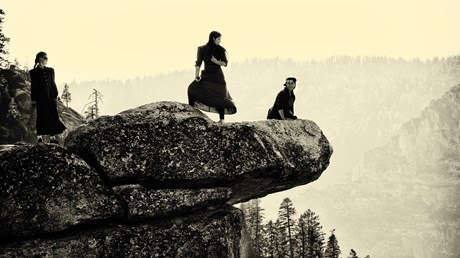Wednesday, 31 August 2016
Proverbs 22:6
from
http://redirect.viglink.com?u=https%3A%2F%2Fwww.biblegateway.com%2Fpassage%2F%3Fversion%3DNIV%26search%3DProverbs%252022%3A6&key=ddaed8f51db7bb1330a6f6de768a69b8
Am I Called To Be A Church Planter?
Regardless of if we are called specifically to be church planters, all of us are called to be ABOUT church planting.

The question, “Am I called to be a church planter?” is not a straightforward one. It’s not like, “Should I breathe?” or “Should I love others as Jesus does?”
The question, “Am I called to be a church planter?” is kind of like asking, “Should I go into an Arts program, Science Program, or a Trade Program?” What’s implied behind this question is the importance of further education. So the question is more a matter of, “Which route will you take?”
Or it’s like the question, “Should I eat a pop-tart for breakfast?” Yes, obviously you need to eat food, but if you eat a pop-tart for breakfast, how is that going to affect what you eat for lunch? And how will you deal with the sugar crash and belly rumblings mid-morning?
When we look at the biblical commandment to “Go, therefore, and make disciples of all nations,” the natural outflow of that is the planting of new churches.
We see this through the Early Church and how the apostles preached the gospel, made disciples, and planted churches that then preached the gospel, made disciples, and planted churches.
I mean, just look through the book of Acts! And then look at how the New Testament was written to new churches in their respective life situations. Essentially, the New Testament can be seen as an anthology of church plants. The fact is, just like we all need to eat food or we will die, we need to all be about church planting, or the church will die.
So the better question that we need to answer is, “Am I called to be about church planting?” And let me make this easy for you. If you’re a follower of Christ, the answer is a default yes.
Now there are people ...
from
http://redirect.viglink.com?u=http%3A%2F%2Ffeeds.christianitytoday.com%2F%7Er%2Fchristianitytoday%2Fctmag%2F%7E3%2FT3yJJYqTkHM%2Fam-i-called-to-be-church-planter.html&key=ddaed8f51db7bb1330a6f6de768a69b8
Where Have I Heard This Before?
from
http://redirect.viglink.com?u=http%3A%2F%2Fwww.patheos.com%2Fblogs%2Ftippling%2F2016%2F08%2F31%2Fwhere-have-i-heard-this-before%2F&key=ddaed8f51db7bb1330a6f6de768a69b8
Why Burkinis Should Matter To Christians Who Care About Religious Freedom
We must speak into religious liberty issues that protect the rights of those who believe differently than we do.

Yesterday I wrote an article for Religion News Service about women and burkinis. But, it was not really about women and burkinis. It was about secularism and its march.
Before you go much further, click here and see this picture at the New York Times. It’s of the French police making a woman take off more clothes to stay on a beach.
So, this is not really about burkinis, but it is about the right of religious people to live out the implications of their beliefs, even in the face of the secular march of the Western world.
I’ve written on that before, talking about religions freedom in an earlier RNS column.
In "3 reasons Christians should back religious freedom for all,” I explained:
- The First Amendment does not protect certain faiths, but all faiths, and people of no faith.
- Minority faiths, like minority viewpoints, are the ones who need the most protection.
- When those of us who identify as Christians allow the government to pick whose freedoms are recognized, we undermine our own religious liberties.
So, why do I, an evangelical Christian, who wants to see women (and men) liberated from the oppression that the burkini represents and set free in Christ, write the RNS article and now this post? As I state in the RNS article, because of religious liberty.
If we don’t speak out, Muslims in France will not be the only ones stripped of their religious liberty. We can’t stand idly by today because it is not “our” religious liberty that is being trampled upon. Next time, as secularism continues its march across the West, it very well might be us.
Religious liberty for some soon means religious liberty for none.
I don’t want Muslim women forced to strip off some of their clothes on the beaches ...
from
http://redirect.viglink.com?u=http%3A%2F%2Ffeeds.christianitytoday.com%2F%7Er%2Fchristianitytoday%2Fctmag%2F%7E3%2FObaiwgntILo%2Fwhy-burkinis-should-matter-to-christians-who-care-about-rel.html&key=ddaed8f51db7bb1330a6f6de768a69b8
Teens Read Bible More During the School Year
The latest study from Barna also shows how many teens think the Bible offers hope, and whether their house rules are influenced by Scripture.

Most practicing Protestant teenagers—those who identify as Protestant, attend church at least once a month, and say their faith is very important in their lives—who read their Bible do so the same amount all year long (73%), much like all Bible-reading American teens (69%).
Of those who are left, 18 percent of practicing Protestant teens read more during the school year; only half that amount read more during the unstructured summer (9%). Those numbers echo across all teens (21% read more during school, 10% in the summer) and non-practicing Christian teens (19% read more in the school year, 10% in the summer).
Those findings come from the second annual poll of how more than 1,000 teens ages 13 to 17 interact with the Bible, commissioned by the American Bible Society and conducted by the Barna Group in May.
Though there are fewer of them (16%, compared to 20% in 2015), practicing Protestant teens look a lot like they did last year. Slightly fewer said the Bible contains everything needed for a meaningful life (85%, down from 88%) and said they read their Bible every day (12%, down from 16%). A few more said they had read a liturgical text in the last week (14%, up from 10%).
The survey also asked brand-new questions, including whether teens saw their parents reading the Bible. Half of practicing Protestants (49%) said their parents read Scripture regularly; another 42 percent said sometimes.
Teens whose parents read the Bible regularly are more likely to read it themselves, Barna told CT. Among teens who say their parents read the Bible regularly or sometimes, 45 percent report reading from the Bible at least once a week, compared to just 5 percent of teens whose parents do not read it regularly.
Of the teens who read ...
from
http://redirect.viglink.com?u=http%3A%2F%2Ffeeds.christianitytoday.com%2F%7Er%2Fchristianitytoday%2Fctmag%2F%7E3%2FUhwCNjYvQhQ%2Fteens-read-bible-more-during-school-year.html&key=ddaed8f51db7bb1330a6f6de768a69b8
Tuesday, 30 August 2016
Psalm 95:6-7
from
http://redirect.viglink.com?u=https%3A%2F%2Fwww.biblegateway.com%2Fpassage%2F%3Fversion%3DNIV%26search%3DPsalm%252095%3A6-7&key=ddaed8f51db7bb1330a6f6de768a69b8
Q+A With Christena Cleveland: ‘I Felt For the First Time—I’m Not Alone’
What everyone needs to know about supporting women of color in conferences and churches.

If you’re a woman of color who works in or serves with an evangelical organization, you’re probably used to being the only one who shares your gender and background. The overwhelming majority of evangelical organizations, colleges, and churches are run and often staffed by white men (and to a lesser extent white women). Conference speaker lists and book award lists can look similarly homogenous. Dealing with the patronizing or ignorant remarks of well-meaning coworkers and people who “don’t see color” may leave you exhausted.
Enter the Women of Color retreat: Organized for the first time last year by Duke Divinity School professor Christena Cleveland and McAfee School of Theology professor Chanequa Walker-Barnes, the 24-hour program is designed to encourage and support women of color of faith. This year’s conference will be held this weekend in Los Angeles at the conclusion of the Christian Community Development Association (CCDA) conference. (More info here.)
“So much of the work that we do, the battles that we face, and the quandaries that we find ourselves in, we’re doing it isolated, because we’re each called to different organizations,” Cleveland recently told CT.
Last year’s retreat was a welcome break from that reality.
“It was powerful to walk into the room and know that I was at home. It wasn’t just, Oh I read an article that really encouraged me. It was, This person is sitting right next to me. We are holding hands and talking about life together.”
Cleveland, the author of Disunity in Christ, recently discussed with Lee her vision for the retreat, whether its model can be used at other Christian conferences, and how church leaders and ...
from
http://redirect.viglink.com?u=http%3A%2F%2Ffeeds.christianitytoday.com%2F%7Er%2Fchristianitytoday%2Fctmag%2F%7E3%2FLA-AcAwaKw0%2Fqa-with-christena-cleveland-color-outside-lines.html&key=ddaed8f51db7bb1330a6f6de768a69b8
Fearless Faith in a Time of Forgetting
Our culture can’t remember what makes Christianity good, but there's no reason to freak out.

The paradoxical pairing of nostalgia and forgetfulness are everywhere in today’s American culture: Trump supporters who want to “make America great again,” one shocking @realDonaldTrump tweet at a time; hipsters who want grandpa’s vintage manliness without his Eisenhower-era values; movie fans who love period films but can’t remember the best-picture winner from last year.
Then there’s this particularly widespread memory lapse: We say we want a good society with morally upright citizens, but we forget the significant role Christians play, and have played for millennia, in the world’s flourishing. It’s something Christians themselves are forgetting. Many are increasingly embarrassed, self-loathing, and viciously infighting. At times, they’re more vocal on blogs and Twitter about the alleged good-for-nothing horribleness of Christians than the most ardent atheist.
Today’s religious freedom debates exemplify this amnesia about Christianity’s contributions to the common good. In the balancing act between LGBT protections and free exercise protections for religious businesses and institutions, federal and state governments seem poised to dispense with the latter for the sake of the former. This summer California debated a controversial proposed law (SB 1146) that threatened to drastically narrow religious protections for the state’s Christian colleges and universities, subjecting religious schools to lawsuits and loss of state financial aid for their students if they continued enforcing admissions, housing, hiring, and other policies based on their traditional beliefs about sexuality and gender. Due to an unprecedented public outcry, including from African ...
from
http://redirect.viglink.com?u=http%3A%2F%2Ffeeds.christianitytoday.com%2F%7Er%2Fchristianitytoday%2Fctmag%2F%7E3%2FkQKu1U6K1Is%2Ffearless-faith-in-time-of-forgetting.html&key=ddaed8f51db7bb1330a6f6de768a69b8
Kneeling is a Mortal Sin
from
http://redirect.viglink.com?u=http%3A%2F%2Fwww.patheos.com%2Fblogs%2Ftippling%2F2016%2F08%2F30%2Fkneeling-is-a-mortal-sin%2F&key=ddaed8f51db7bb1330a6f6de768a69b8
Recovery After Disaster: Lessons From Katrina For Today
It's been 11 years since Hurricane Katrina. And there is still much we can learn from that disaster.

Eleven years ago on August 29, 2005, Hurricane Katrina came ashore between Louisiana and Mississippi. It was one of the most destructive natural disasters in United States history. Katrina caused the deaths of almost 1,500 Louisiana residents. Approximately 80% of the city was flooded. The population of New Orleans fell from 455,188 before Katrina (July 2005) to 208,548 one year later (July 2006). While Katrina’s destruction happened years ago, it has important lessons for us today.
As a professor at the New Orleans Baptist Theological Seminary, I began a study of the impact of Katrina on all of the 1,504 worship centers (all religions) in five parishes (counties) around New Orleans.
After four years, over 25% of the worship centers in Orleans Parish were not yet operational. Today, most of the worship centers have not returned to their pre-Katrina numbers.
Over 11 years, my research team and I have made repeated visits to churches that were not previously operating. Recently, I was excited to learn that two churches I thought would never recover were now operating. In one of these churches located in a remote area next to a bayou, the pastor stayed at the church during Katrina. His body has never been found.
In my research, I learned some important lessons that can aid in the recovery of churches and their communities in the future.
Lesson #1: Outside Help Is Important
While local people were focused on the recovery of their houses and jobs, thousands of people from all over the country came to assist those impacted by Katrina. I believe this outside help was critical to the survival of churches in the New Orleans area. Most of the churches that died in Orleans Parish were small, with no contacts outside the area. No one ...
from
http://redirect.viglink.com?u=http%3A%2F%2Ffeeds.christianitytoday.com%2F%7Er%2Fchristianitytoday%2Fctmag%2F%7E3%2Ft4D98DFsQ1Y%2Frecovery-after-disaster-lessons-from-katrina-for-today.html&key=ddaed8f51db7bb1330a6f6de768a69b8
Fearless Faith in a Time of Forgetting
Our culture can’t remember what makes Christianity good, but there's no reason to freak out.

The paradoxical pairing of nostalgia and forgetfulness are everywhere in today’s American culture: Trump supporters who want to “make America great again,” one shocking @realDonaldTrump tweet at a time; hipsters who want grandpa’s vintage manliness without his Eisenhower-era values; movie fans who love period films but can’t remember the best-picture winner from last year.
Then there’s this particularly widespread memory lapse: We say we want a good society with morally upright citizens, but we forget the significant role Christians play, and have played for millennia, in the world’s flourishing. It’s something Christians themselves are forgetting. Many are increasingly embarrassed, self-loathing, and viciously infighting. At times, they’re more vocal on blogs and Twitter about the alleged good-for-nothing horribleness of Christians than the most ardent atheist.
Today’s religious freedom debates exemplify this amnesia about Christianity’s contributions to the common good. In the balancing act between LGBT protections and free exercise protections for religious businesses and institutions, federal and state governments seem poised to dispense with the latter for the sake of the former. This summer California debated a controversial proposed law (SB 1146) that threatened to drastically narrow religious protections for the state’s Christian colleges and universities, subjecting religious schools to lawsuits and loss of state financial aid for their students if they continued enforcing admissions, housing, hiring, and other policies based on their traditional beliefs about sexuality and gender. Due to an unprecedented public outcry, including from African ...
from
http://redirect.viglink.com?u=http%3A%2F%2Ffeeds.christianitytoday.com%2F%7Er%2Fchristianitytoday%2Fctmag%2F%7E3%2F4hZ-2CbcUjk%2Ffearless-faith-in-time-of-forgetting.html&key=ddaed8f51db7bb1330a6f6de768a69b8